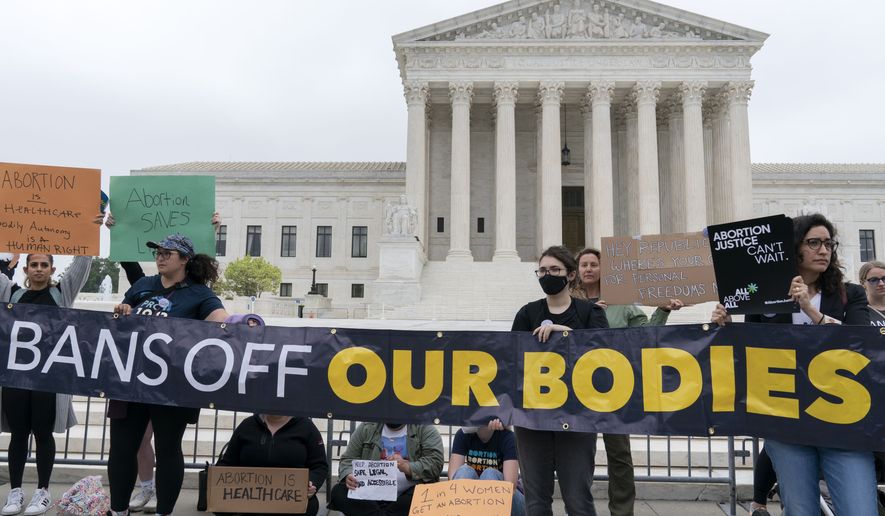Experts on government leaks and the Supreme Court say that whoever leaked a draft opinion indicating the high court is poised to overturn Roe v. Wade might not face criminal charges but could lose their legal career as a result of the breach.
Steven Aftergood, who studies government secrecy policy at the Federation of American Scientists, said Supreme Court draft opinions are not protected as classified government information like defense secrets. Therefore, it is unlikely that whoever leaked the draft opinion would face criminal charges.
“Almost all prosecutions in previous ’leak’ cases involved unauthorized disclosures of classified information in violation of the Espionage Act statutes. That is obviously not the case here,” Mr. Aftergood told The Washington Times.
He said it is too soon to know whether a crime may have been committed by disclosing the document. If a justice released the opinion to the press, it would violate Supreme Court protocol but would not run afoul of any criminal statute, he said.
However, if another person — like a clerk to one of the justices — gained access to the draft and released it without authorization, that could be considered a theft of government property.
“Sometimes lower court opinions include defense or intelligence information that is classified by an executive branch agency. That information is redacted before the opinion is published. Some other court records may include privacy information that is protected from disclosure. But neither of those categories apply to draft Court opinions that do not include such information,” Mr. Aftergood said.
SEE ALSO: Supreme Court confirms draft opinion is authentic but not final ruling
It’s unclear at this stage if the Justice Department would investigate, he said. It would depend on whether there is credible evidence or suspicion a crime has been committed. He added that if Chief Justice John G. Roberts Jr. asks for a probe, the Justice Department would respond.
Carrie Severino, a former clerk for Justice Clarence Thomas, said if the draft opinion was printed, the system at the court would be able to trace who did so and be a possible way to reveal who leaked the opinion.
“I think there could be serious repercussions on whether they would be able to practice law after such a breach of trust,” Ms. Severino said, noting she is operating under the assumption a clerk leaked the document to the press.
A spokesperson for the high court did not respond to a request for comment.
Court watchers were aghast Monday night when news broke that a draft opinion indicates the high court would overrule the 1973 Roe decision, which gave women a national right to an abortion until fetal viability.
It is the first time a full draft opinion has been leaked in the Supreme Court’s 233 year history, according to former law clerks.
SEE ALSO: Biden vows to codify abortion rights into law, urges voters to back pro-choice candidates
In the 98-page draft opinion obtained by Politico, Justice Samuel A. Alito Jr. said abortion should return to the state legislatures.
“The Constitution makes no reference to abortion,” he wrote. “Roe was egregiously wrong from the start.”
“It’s time to heed the Constitution and return the issue of abortion to the people’s elected representatives,” reads the opinion, dated from February.
An official ruling in the case is expected by the end of June.
The court is weighing a Mississippi ban on abortion at 15 weeks in the case of Dobbs v. Jackson Women’s Health Organization.
Mississippi officials argue that Roe should be overturned because it’s outdated. The state contends the viability standard set out in Roe is unclear, and Mississippi has an interest in banning abortions after 15 weeks to protect women’s health and that of unborn children.
The legal battle was brought by Jackson Women’s Health Organization, the state’s only abortion clinic, and a doctor who provides abortions. According to court papers, the clinic provides abortions up to 16 weeks of gestation.
They challenged the state’s Gestational Age Act, enacted in 2018. The law bans abortions after 15 weeks unless there is a medical emergency or severe abnormality within the fetus.
The abortion providers told the court in their filing that the state’s interest in the woman’s health and children doesn’t begin until viability, occurs “months” after the 15-week marker set in the law.
• Jeff Mordock can be reached at jmordock@washingtontimes.com.
• Alex Swoyer can be reached at aswoyer@washingtontimes.com.




Please read our comment policy before commenting.